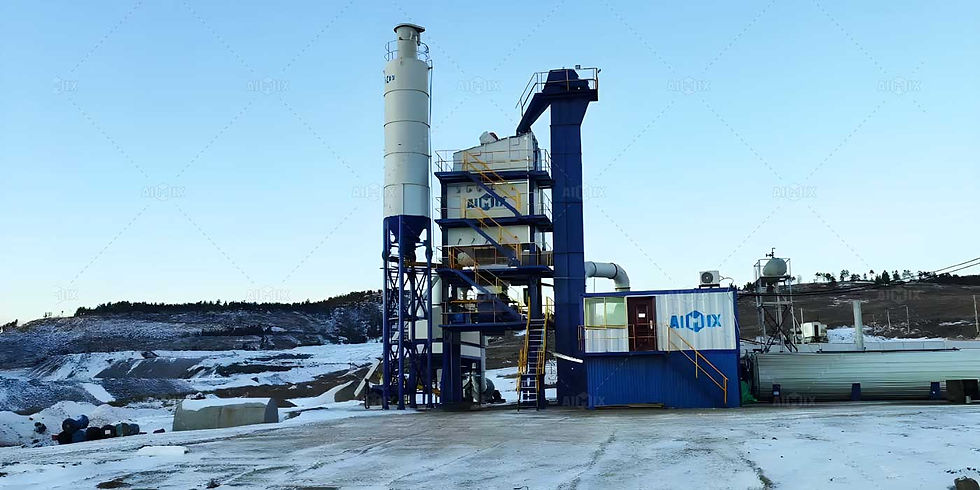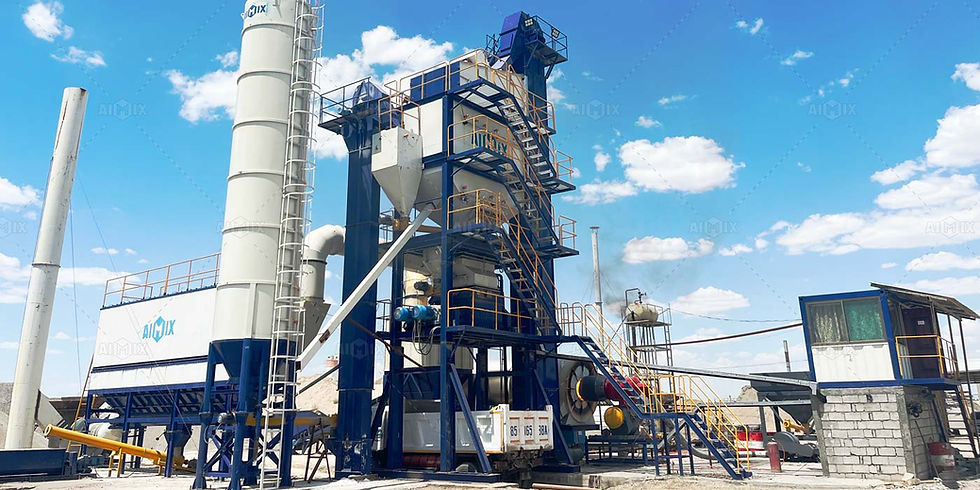For a Family-Owned Paving Business in Nigeria, Does a 20 t/h Asphalt Plant Cover Local Town Road Contracts (~500–1,000 Tons Each)?
- aimixglobal5
- Oct 8, 2025
- 3 min read
Many family-owned paving businesses in Nigeria want to grow steadily without taking on too much risk. When local town councils release contracts for small and medium road projects, usually in the range of 500–1,000 tons of asphalt, one question comes up often: are 20 t/h nigeria asphalt plants enough? Choosing the right asphalt plant size is not only about output, but also about balancing costs, contract size, and future growth. Let’s explore this step by step.

Understanding the Local Contract Size
Most road contracts in smaller towns across Nigeria range between 500 and 1,000 tons of asphalt per job. These projects are often for road resurfacing, township streets, or small access roads. The demand is not as high as for expressways, yet the contracts are frequent enough to sustain a family-owned paving company.
Therefore, it makes sense to look at how quickly a 20 t/h small asphalt mixing plant can deliver the required volume for these contracts.
How Much Can a 20 t/h Plant Produce in Practice?
A 20 t/h asphalt plant produces 20 tons of asphalt every hour under standard working conditions. If the plant runs for 8 hours a day, it can make about 160 tons daily. Over a week, assuming five working days, that equals around 800 tons.
In other words, a single local road project of 500–1,000 tons can be completed in just three to six days of production. This speed matches well with township contracts, where timelines are usually a few weeks rather than a few days. This calculation shows that a 20 t/h plant can comfortably handle such projects.

Balancing Efficiency and Investment
While larger asphalt plants can produce faster, they also require higher capital, more land, and larger teams. For a family-owned business that handles contracts under 2,000 tons, a 20 t/h plant avoids unnecessary costs. It provides enough capacity to win bids while keeping daily operations simple and cost-efficient.
Moreover, smaller plants are easier to install, relocate, and maintain. This flexibility matters in Nigeria, where projects may be scattered across different towns and transport logistics can be challenging.
Considering Fuel and Power Factors
Another important aspect is fuel and power. In many Nigerian towns, electricity supply is unreliable. A 20 t/h mini asphalt plant for sale can often be run with a diesel generator, making it more independent and stable. This independence ensures that production is not interrupted by local power shortages, which is a common problem for larger stationary plants.
Therefore, when reliability is weighed together with capacity, a 20 t/h bitumen plant looks even more attractive for smaller-scale contractors.

Room for Growth and Future Contracts
Some business owners may worry that a 20 t/h asphalt plant could limit their future growth. However, the reality is different. For township projects of 500–1,000 tons, the plant provides an excellent match. If later the company wants to target highway or regional projects requiring 5,000 tons or more, then scaling up to a 40–60 t/h plant may be the right step.
In this way, a 20 t/h asphalt plant serves as a solid starting point. It allows family-owned businesses to win steady contracts, recover their investment quickly, and then plan for larger upgrades once their market expands.
Practical Example: Completing a Township Road Contract
Imagine a family-owned paving company winning a contract for 800 tons of asphalt in a small Nigerian town. With a 20 t/h plant, they can produce around 160 tons daily. In just five days, the full contract is covered. Workers can lay the asphalt gradually, aligning production with paving speed, without rushing or causing delays. This smooth workflow is both efficient and realistic.
Such real-life scenarios confirm that for this size of work, a 20 t/h asphalt plant is not only suitable but also highly practical.

Conclusion: Is a 20 t/h Asphalt Plant Right for You?
For family-owned paving businesses in Nigeria, targeting contracts of 500–1,000 tons, a 20 t/h asphalt plant strikes the right balance. It delivers enough capacity to complete jobs on time, while keeping investment, fuel, and labor costs manageable. It also provides flexibility to operate in towns where infrastructure may not be stable.
Take the Next Step With Us
If you are considering starting or upgrading your paving business, we can help you choose the right asphalt plant. Our team has experience working with family-owned contractors across Nigeria, and we understand the challenges of local road projects. Contact us today to discuss your needs, and let us guide you toward a plant size that helps your business grow steadily and profitably.



Comments